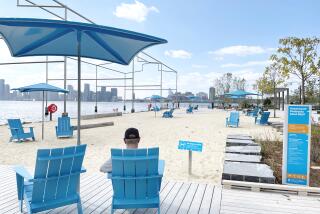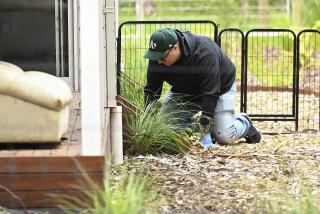Government Tries to Retake Lebanon
The government tried to assert its limited authority across Lebanon on Thursday, reopening the bombed Beirut airport and establishing checkpoints and detonating unexploded ordnance in the battered south.
Pro-Western political leaders offered blistering criticism of Hezbollah leader Sheik Hassan Nasrallah, who has slipped comfortably into the role of hero and statesman in the wake of the stubborn fight his militia put up against Israel’s vaunted military.
But across the towns and villages of southern Lebanon, Hezbollah’s strength and energy appeared unaffected by the criticism, demands that it disarm or the return of the Lebanese army to the region for the first time in 28 years.
On a road outside the Shiite Muslim town of Adessa, two well-dressed women wearing sunglasses stood in a shattered mosque on a hill overlooking a green carpet of farms across the border in Israel. They laughed and provocatively waved Hezbollah’s yellow flag at five parked Israeli army tanks as a large surveillance drone hovered overhead.
“We support the Lebanese army coming here on one condition: that they act like Hezbollah,” said Layla Awada, 42, a travel agent who said she had driven to the border spot from her nearby hometown of Aitaroun to mock the Israelis.
The Lebanese army should not even try stripping Hezbollah of its weapons, Awada said.
“Impossible,” she said, adding that as long as the Israelis were so close, “we won’t allow the government to take our weapons away.”
That defiance, reflected in portraits of Nasrallah and Hezbollah flags snapping in the breeze throughout the south, underscores the enormous challenge facing the Lebanese government as it tries to rein in Hezbollah.
So far, the government has moved cautiously. Despite cease-fire terms demanding disarmament of Lebanon’s militias, the government has shied away from confronting Hezbollah over its extensive arms caches, saying only that it will not allow anyone to carry weapons in public.
Two of Lebanon’s senior politicians accused Nasrallah on Thursday of putting selfish aims ahead of the national interest.
“Whenever you want, you recognize the state, and whenever you want, you don’t,” a Druze leader, Walid Jumblatt, said at a nationally broadcast news conference during which he accused Nasrallah of being a tool of Iran.
“But there is something that has been destroyed: the confidence of the Lebanese people that they will not be dragged into another round of war. Iran’s money comes at the expense of Lebanon’s destruction.”
And Saad Hariri, who leads the largest bloc in parliament, said Nasrallah should give up his weapons and stop undermining the Lebanese state.
“There is no honor for Lebanon without the state,” Hariri said in another televised speech. “The Lebanese will not allow anyone to make the state the weakest part of the national equation.”
The government took an important step in demonstrating its clout by reopening the capital’s main airport, which was bombed early in the Israeli campaign.
Commercial flights resumed Thursday for the first time since the war began July 12, with three flights from Amman, Jordan, landing and a British Airways jet arriving with a cargo of humanitarian supplies.
The airport opening provided a badly needed transportation link and also served as a reminder that parts of the country other than the south also paid a high price in the war.
The Lebanese soldiers sent to the south were the first there since a previous war with Israel in 1978.
Under the cease-fire agreement, Lebanon plans to send 15,000 troops into the south over the next few days, to be backed up by a strengthened United Nations peacekeeping force, known as UNIFIL.
The Israeli military said about two-thirds of the areas of the south that it had held had been turned over to UNIFIL by Thursday evening, leaving troops only in a strip close to the border.
Traveling in the back of bouncing trucks, about 800 beret-wearing Lebanese troops began establishing a headquarters in the eastern town of Marjayoun, and 500 others crossed makeshift bridges over the Litani River to cluster in Tyre and Tibnin and a few towns in between.
They set up several checkpoints and began detonating some of the unexploded ordnance that litters the south.
Israeli soldiers have completely withdrawn from towns such as Kfar Kila and Adessa near the barbed-wire-lined border.
Residents continued to trickle back, encountering buildings scorched by the fighting and banners erected by Hezbollah proclaiming that the Israelis had been defeated.
There was no sign of the Lebanese army in Kfar Kila and Adessa.
On tense streets, where bearded young men wheel about town and listen in on others’ conversations, those who will talk say they do not object to the Lebanese army’s impending arrival. But they insist that Hezbollah should not and will not disarm.
Yet disarmament of Hezbollah is exactly what Israel demands, a desire shared by residents of the south’s few scattered Christian communities who blame the militia’s rocket fire aimed at Israel for provoking the rain of destruction.
“We would love to have the Lebanese army in our area to protect us,” said Shahada Maroun, 32, who works in the local bank of Ain Ebel, a Christian village of about 15,000 outside Bint Jbeil that emerged from the bombings bruised but largely intact.
“They are a legitimate force, while Hezbollah is a terrorist organization, not a resistance. And we have no way to protect ourselves from them.”
But Maroun and his brother, Georges, a 33-year-old farmer, say they have no confidence that the army will arrive as promised.
“They’re not coming, not even in a year,” Georges said.
A senior Lebanese military officer in Beirut who asked not to be identified because of a government ban on talking to the media, contended that troops would be deployed across the south by Sunday. And he predicted that Hezbollah would offer no resistance to their arrival.
“These are our people, and we are going there to protect them,” the officer said. “Many of the soldiers are from the south and have families and friends there. And many of those in Hezbollah have brothers in the army.”
*
Times staff writers Laura King in Jerusalem and Borzou Daragahi in Beirut and special correspondent Maha al-Azar in Beirut contributed to this report.
More to Read
Start your day right
Sign up for Essential California for news, features and recommendations from the L.A. Times and beyond in your inbox six days a week.
You may occasionally receive promotional content from the Los Angeles Times.





